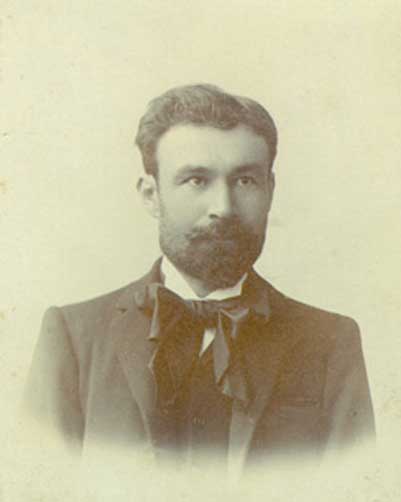.

Andreas Karkavitsas or Carcavitsas(Greek: Ανδρέας Καρκαβίτσας, Lechaina, Greece 1866 - Marousi October 10, 1922) was a Greek novelist. He was a naturalist, like Alexandros Papadiamantis.
Biography
He was born in 1866 in the north-west Peloponnese, in the town of Lechaina in the modern Ilia Prefecture. He studied medicine.
As an army doctor he travelled across a great range of villages and settlements, from which he recorded traditions and legends.
He died on October 10, 1922 of laryngeal cancer.
He is commemorated in a street that runs west of Papaflessa and Polytechneiou Streets (the old GR-9, Patras - Pyrgos - Kyparissia) to the western portion near the road to Lechaina Beach. By the intersection in a small square, a statue was also erected in bronze and marble.
Selected writings
Year Title English meaning Published in
1892 Διηγήματα (Diiyimata) Stories Athens
1896 Η Λυγερή (I Liyeri) The willowy girl Athens
1897 Θεσσαλικές εικόνες. Ο ζητιάνος (Thessalikes eikones. O zitianos) Thessalian images. The beggar Athens
1899 Λόγια της πλώρης. θαλασσινά διηγήματα (Logia tis ploris. Thalassina diiyimata) Words from the prow. Sea stories Athens
1900 Παλιές αγάπες 1885-1897 (Palies agapes) Old loves 1885-1897 Athens
1904 Ο αρχαιολόγος (O arheologos) The archeologist Athens
1922 Διηγήματα του γυαλιού (Diiyimata tou yaliou) Stories from the shore Athens
1922 Διηγήματα για τα παληκάρια μας (Diiyimata ya ta palikaria mas) Stories about our lads Athens
Karkavitsas wrote in the European tradition of naturalism (exemplified by Émile Zola), which does not shrink from portraying the seamier parts of life among humble people, rather than romanticising or embellishing reality. He was a folklorist with a gift for spinning tales full of authentic details of simple people's lives, local customs, dialects and folktales, as well as psychological insights about them. He was more successful as a short-story and novella writer. "The Beggar" is a novella about con-men, violence and the grotesque practices of professional beggars (including purposely maiming children to turn them into profitable objects of pity). "Words from the prow" is about the lives of seafarers, fishermen and sponge-divers, full of arcane details of their craft as well as folk-tale-inflected plots of tragedy, shipwreck, hands lost at sea, murder, superstition and the supernatural, as well as the joys of making a living off the sea.
Translation
The Beggar, tr. W. F. Wyatt (1982)
References
Encyclopædia Britannica online
| Ancient Greece
Science, Technology , Medicine , Warfare, , Biographies , Life , Cities/Places/Maps , Arts , Literature , Philosophy ,Olympics, Mythology , History , Images Medieval Greece / Byzantine Empire Science, Technology, Arts, , Warfare , Literature, Biographies, Icons, History Modern Greece Cities, Islands, Regions, Fauna/Flora ,Biographies , History , Warfare, Science/Technology, Literature, Music , Arts , Film/Actors , Sport , Fashion --- |
From Wikipedia, All text is available under the terms of the GNU Free Documentation License

